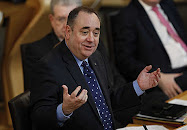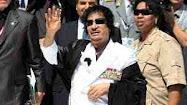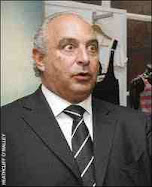"I promise to pay the bearer on demand the sum of twenty pounds..."
We recognise those words, do we not, ladies and gentlemen? But what do they mean? I'll tell you. They mean, when you present a note, a twenty pound note, that's exactly what you're entitled to: the sum of twenty pounds. You could view it as a binding contract."
"Hello. I am an exceedingly important member of the Bank of All England. And I help determine monetary policy. I have come here today to talk to you about quantitative easing and its applications. Now, quantitative easing is something we at the Bank undertake when there is a recession - when the economy is in the doldrums and we want to spice things up a bit. It is then, and only then, we resort to quantitative easing - or to give it its old fashioned title - printing money."
"We have to print this money, folks, because a slowing of the money supply has resulted in a lack of economic activity. At times like these, people are not of a mind to open their wallets and spend their hard earned cash. And this lack of spending, or should I say, lack of a desire to spend, simply perpetuates stagnation.
"So we at the Bank take it upon ourselves to increase the money supply and, consequently, economic activity, by printing money and allowing it to circulate through the economy. We are of the opinion that this will get things moving, free up the system, loosen the old bowels of the economy if you will. Banks can start trading this money with other banks, and, with no less an entity than the government itself. And this semblance of activity will make ordinary folk assume that the stale old economy has sprung back into life. They will become confident that "happy days are here again" and they will start spending their own cash. It worked in Weimar Germany and in Mr Mugabe's Zimbabwe. And indeed, we think it should, similarly, work here.
"Now there are of course some naysayers, some pessimists, who will suggest that this is all a con. They'll point out it's all well and good having a binding contract saying "we promise to pay the bearer on demand the sum of twenty pounds". But what's the point of such a contract if what's promised has been diluted, watered down, by the person who made the promise in the first place? These cynics suggest it's like buying a bottle of malt whisky for twenty pounds, only to find the whisky has been watered down to the point where it tastes like donkey urine. Indeed there are others who state, with some temerity in my view, that the only people who benefit are the investment bankers who merrily trade this "new money" and make fat commissions on their trades."
"And though I may sympathise with these sentiments, might I ask: Do you have any better ideas? For it is all well and good bashing bankers. But these bankers are the lifeblood of our nation - as well they demonstrated back in 2008. Might I also remind you that, though we may live in a democracy, this does not mean that you, the people, have any say over monetary policy. Indeed not! You have not the slightest understanding of monetary policy. Nor should you. That is why you employ fine men (and women) like me and my associates to handle such complex affairs - as indeed we did so convincingly in 2008!"
"So I say: Leave monetary policy to the people who know about these things, to the people who have spent their lives deciding such matters. We at the Bank of All England have demonstrated on countless occasions that we, and we alone, know how to wreck, then rescue the economy. You, the people, have not the faintest idea how to engineer the wonderful monetary roller-coaster we have seen in recent years. And nor should you!
"And so I will end my peroration by saying to you: You, the people... you should look after the pennies. And The Bank - The Bank of All England - shall indeed look after itself."
Subscribe to:
Post Comments (Atom)

































































































































No comments:
Post a Comment